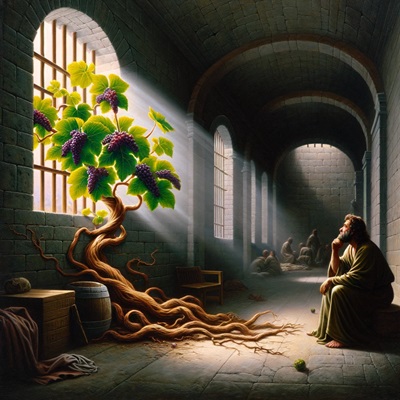
Jeremiah Envisions the Righteous Branch
ChatGPT-4/DALL-E3, 2023-11-29
My dear friends,
Jeremiah 33:14-16 presents profound spiritual teachings that resonate with both Christian and Buddhist perspectives, offering lessons for our own spiritual development.
says the LORD,
when I will fulfill the promise
I made to the house of Israel
and the house of Judah.
The text begins with a declaration of the LORD's promise to the house of Israel and Judah. This speaks to the Christian understanding of God's faithfulness and the fulfillment of divine promises. Spiritually, this can be interpreted as an assurance that faith in divine providence and trust in a higher power's plan is essential. This aligns with the Buddhist concept of trusting in the Dharma (cosmic law and order), suggesting that aligning oneself with universal truths leads to spiritual fulfillment.
and he shall execute justice and righteousness in the land.
The prophecy of a "righteous Branch" from David's line who will execute justice and righteousness parallels the Christian belief in Jesus as the Messiah, embodying divine justice and moral righteousness. This emphasizes the importance of striving for righteousness in our own lives. In Buddhism, this can be likened to the aspiration to embody the qualities of the Buddha, cultivating virtues such as compassion, wisdom, and ethical conduct.
The assurance that Judah will be saved and Jerusalem will live in safety speaks to the Christian hope of salvation and peace through divine intervention. This concept can be broadened to a spiritual quest for inner peace and liberation from suffering, which is a core aspiration in Buddhism. The attainment of inner peace and liberation is achieved through understanding the nature of suffering, its causes, and following a path of ethical living, mental discipline, and wisdom.
The phrase "The LORD is our righteousness" is an ironic play on words referring to King Zedekiah, who imprisoned Jeremiah. This adds a layer of depth and complexity to the interpretation of this passage.
Zedekiah's name in Hebrew, "Tzidkiyahu," literally means "The LORD is righteousness" or "Yahweh is my righteousness." The irony lies in the contrast between the king's name and his actions, particularly his decision to imprison Jeremiah, a prophet of the LORD. This juxtaposition highlights the discrepancy between nominal righteousness (in name) and actual righteousness (in action).
Through this play on words, Jeremiah provides a subtle critique of Zedekiah’s reign and his failure to live up to the ideals his name suggests. This could be seen as an indictment of leadership that professes righteousness but acts contrary to the principles of justice and godliness. It serves as a reminder that true righteousness is not just in name or position but in one's actions and adherence to divine will.
The phrase "The LORD is our righteousness" takes on a deeper meaning in this context. It emphasizes that true righteousness and justice come from God, not from human rulers. This distinction is crucial in both Christian and Buddhist teachings, where righteousness is often linked with divine or universal truth rather than human authority.
This interpretation encourages a reflection on the nature of righteousness. It suggests a journey towards understanding and embodying true righteousness, which transcends names, titles, and human authority. This aligns with the Buddhist idea of seeking truth beyond superficial labels and the Christian emphasis on living in a manner consistent with divine teachings.
In summary, considering the phrase as an ironic reference to King Zedekiah adds a critical dimension to its interpretation. It suggests a spiritual and ethical critique of leadership, a call to authentic righteousness, and a distinction between divine justice and human authority. This nuanced understanding encourages deeper reflection on the qualities of true righteousness and justice in our spiritual journey.